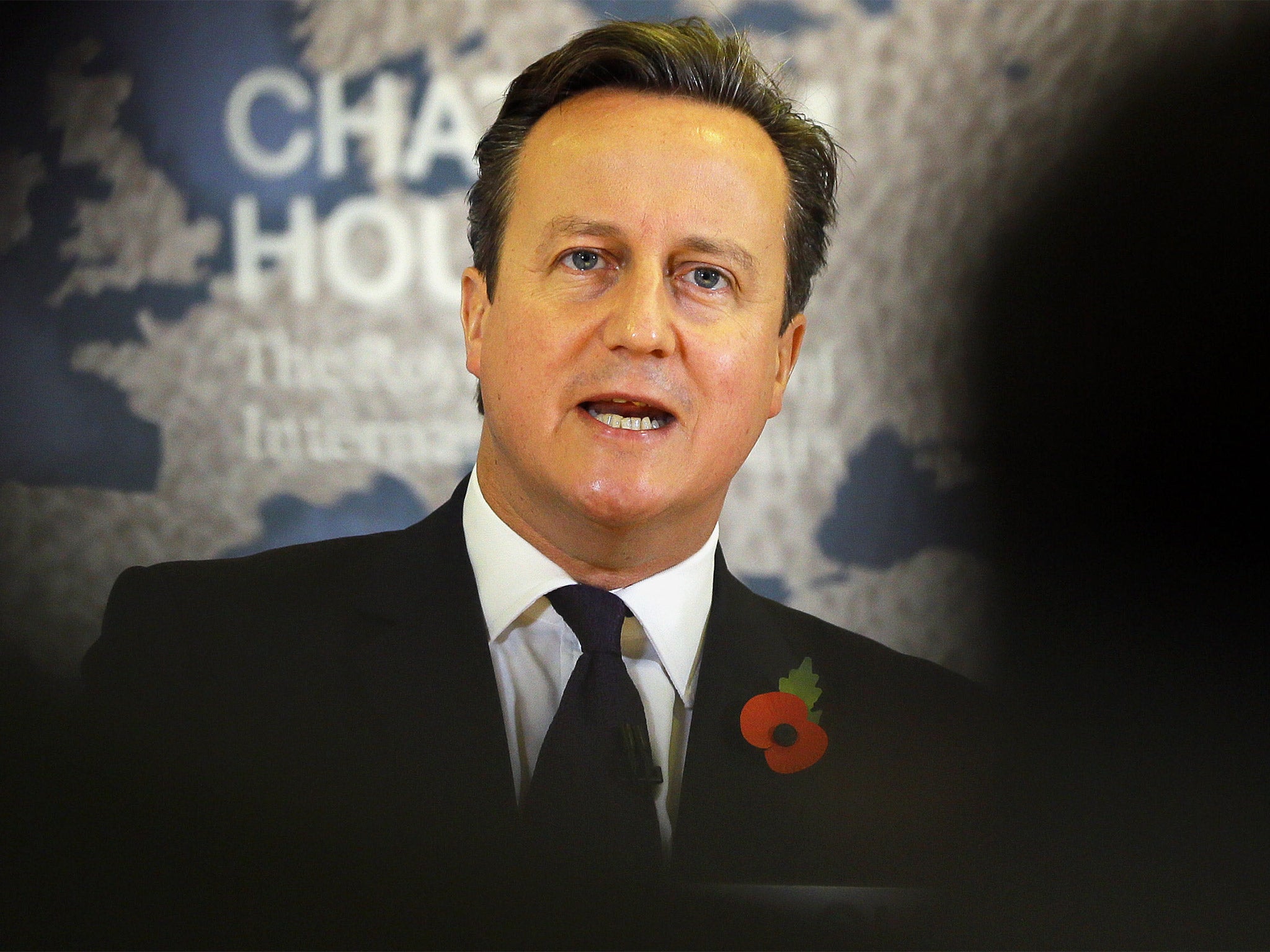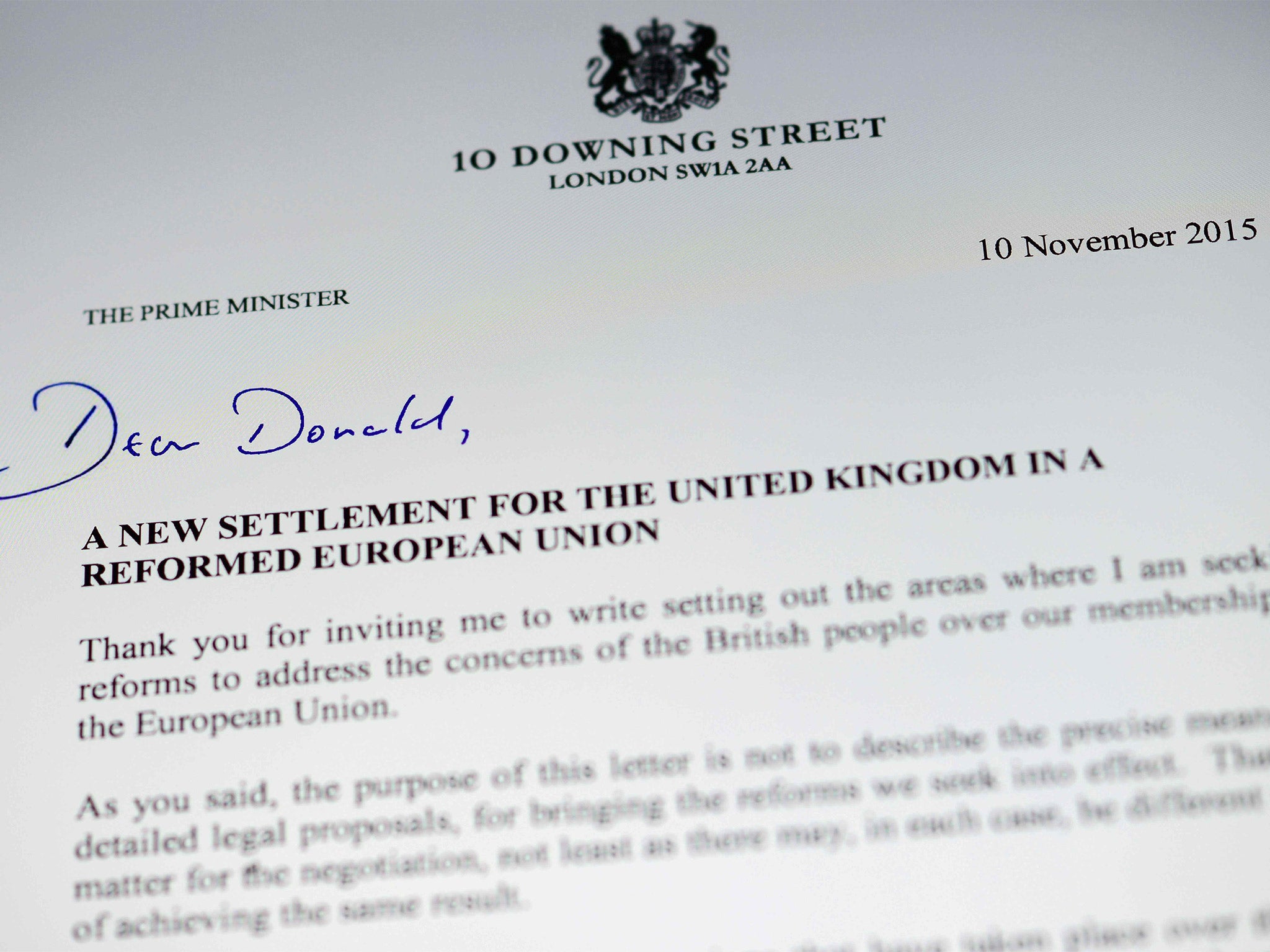EU referendum: David Cameron accused of backtracking on demands to restrict benefits to migrants
Mr Cameron has hinted that the benefit restrictions were no longer a red line for the Government

Your support helps us to tell the story
From reproductive rights to climate change to Big Tech, The Independent is on the ground when the story is developing. Whether it's investigating the financials of Elon Musk's pro-Trump PAC or producing our latest documentary, 'The A Word', which shines a light on the American women fighting for reproductive rights, we know how important it is to parse out the facts from the messaging.
At such a critical moment in US history, we need reporters on the ground. Your donation allows us to keep sending journalists to speak to both sides of the story.
The Independent is trusted by Americans across the entire political spectrum. And unlike many other quality news outlets, we choose not to lock Americans out of our reporting and analysis with paywalls. We believe quality journalism should be available to everyone, paid for by those who can afford it.
Your support makes all the difference.David Cameron has been accused of backtracking on a key demand to allow the UK to restrict benefit payments to EU migrants as part of his renegotiation of Britain’s membership.
Six months ago Mr Cameron pledged a Conservative government would “insist” that EU migrants who wanted to claim tax credits and child benefit must have lived in Britain and paid taxes for a minimum of four years. The party’s election manifesto said the welfare changes would be an “absolute requirement in the [EU membership] renegotiation”.
But in a speech in London on 10 November, Mr Cameron hinted that the benefit restrictions were no longer a red line for the Government, following fierce resistance to the idea from EU countries such as Slovakia and Poland. Instead, the Prime Minister said, he was “open to different ways of dealing with” the issue of migration.
Later the Europe minister David Lidington went further, suggesting in the House of Commons that the Government was prepared to drop the proposal altogether.
“Others in the EU have concerns about this,” he said. “And that’s why we say to them, ‘If that is what you think, put forward alternative proposals that deliver the same result. It is the outcome of the measures – controlled, fair, properly managed migration – that is the end that we seek.”
Cameron’s climbdown
"Those who want to claim tax credits and child benefit must live here for a minimum of four years"
Conservative election manifesto
"I understand how difficult some of these welfare issues are and I am open to different ways of dealing with this issue
David Cameron speaking on 10 November
But the apparent climbdown infuriated Eurosceptic Tory MPs who lined up in the House of Commons to criticise Mr Cameron’s renegotiation proposals which one described as “thin gruel” and “much less” than people had “come to expect from the Government”.
The Leave campaign said the climbdown on benefit reform showed that Mr Cameron had “given up” on any kind of serious renegotiation, while the former Environment Secretary Owen Paterson said the Prime Minister had missed a “once-in-a-lifetime opportunity to reform the UK’s relations with the EU”. The veteran Tory Eurosceptic MP and chair of the European Scrutiny Committee Sir Bill Cash warned that treaty change was needed for “virtually every proposal” – yet treaty change was “not on offer”. “How is he going to be able to sell this pig in a poke?” he asked.
Bernard Jenkin, chairman of the Commons Public Administration Committee, added: “After all the statements made by the Prime Minister [and] the Foreign Secretary about being in Europe but not run by Europe, the pledge to restore the primacy of national parliaments, the pledge to get an opt-out from the charter of fundamental rights, to restore our borders.... After all that – is that it? Is that the sum total of the Government’s position?”
In a letter to the European Council President Donald Tusk, spelling out his renegotiation ambitions, Mr Cameron set out four broad goals he hoped to achieve and insisted a new membership deal must be “legally binding”.
On the future direction of the EU economy the Prime Minister said that new treaties must make clear that there should be no discrimination against businesses outside the eurozone and the integrity of the EU-wide single market must be protected.

On sovereignty Mr Cameron said the EU must change its current treaty obligation to work towards “ever-closer union” and called for new powers for national parliaments to block EU legislation. Such a move is likely to be opposed by MEPs who will see the proposal as an attack on their own prerogatives. The other two areas Mr Cameron said he wanted to see reformed were migrant benefits and competitiveness, and he called for a new target to be set to cut European regulations on business.
But while Mr Cameron was attacked by Eurosceptics for the limited scope of his reform agenda, some senior figures in Brussels suggested that even these might be too much to ensure a successful renegotiation. His bid to curb migrant benefits was described as “highly problematic” by the European Commission.
“We see a number of elements which appear to be feasible, like finding ways to increase the role of national parliaments, and some issues which are difficult, like ever-closer union and the relation between euro ins and outs,” the chief spokesman for the Commission, Margaritis Schinas, said. “And some things are highly problematic as they touch upon the fundamental freedoms of our internal market. Direct discrimination between EU citizens clearly falls into this last category.”
He was echoed by the Czech Prime Minister Bohuslav Sobotka, who said that a benefits curb would be “the most problematic aspect of the British initiative”. Mr Sobotka added that, “The right to work and live anywhere in the EU is absolutely essential to us.”
However, most of the reaction from across the EU was positive. In Berlin, the German Chancellor Angela Merkel said she been in touch with Mr Cameron, and, “if one has the spirit that we can solve these problems, then I’m convinced it can be done”, although she added that some demands were “easier than others”.
Of the other demands, there is broad support for the principle of protecting non-euro countries. Meanwhile, the demand for national parliaments to have more power to block or amend EU proposals has long been supported by the Commission itself.
Cameron debunked
What he said
"We do not want to stand in the way of measures eurozone countries decide to take to secure the long-term future of their currency. But we want to make sure these changes will respect the integrity of the single market, and the legitimate interests of non-euro members."
What he meant
This is Mr Cameron’s biggest bargaining chip. He knows that the eurozone countries eventually need treaty change in order to avoid a repeat of events like the Greek financial crisis. He hopes to use this to win concessions for Britain – and guarantees that non-eurozone countries will not be discriminated against within the single market.
Achievability rating: ****
Most other EU leaders accept that any changes to the eurozone must be accompanied by protection for those countries outside of it. However, the sticking point will be how these guarantees can be given to the UK in advance of wider treaty change which will take years to resolve.
-
What he said
"I want to end Britain’s obligation to work towards an “ever-closer union” as set out in the treaty. It is very important to make clear that this commitment will no longer apply to the United Kingdom. I want to do this in a formal, legally binding and irreversible way.
What he meant
This is a largely symbolic demand with little practical effect on how the EU develops in the future. But, nonetheless, such a change would allow Mr Cameron to go into the referendum claiming that he had, once and for all, ended the EU’s federalist ambitions.
Achievability rating: *****
This should be an easy win for Mr Cameron for the reasons set out above.
-
What he said
"While the European Parliament plays an important role, I want to enhance the role of national parliaments, by proposing a new arrangement where groups of national parliaments, acting together, can stop unwanted legislative proposals.∑∑
What he meant
Mr Cameron knows that the European Parliament is not popular in Britain and giving the UK Parliament a bigger say – or indeed veto over – new EU laws would be a useful concession.
Achievability rating: ***
Some other EU members, such as Holland, are also keen to give their national parliaments greater powers at a European level – and agree that the EU Parliament is not up to the job. But the devil will be in the detail of how such new arrangement might work and will be vigorously opposed by MEPs.
-
What he said
"We have proposed that people coming to Britain from the EU must live here and contribute for four years before they qualify for in-work benefits or social housing. And that we should end the practice of sending child benefit overseas. I understand how difficult some of these issues are for other member states and I look forward to discussing these proposals further so we can find a solution that deals with this issue.
What he meant
This section of the letter is both a concession and a plea. Mr Cameron has previously suggested that restricting migrant benefits is a red line for him but his letter suggests that the line maybe a little less red than it was. But there is no suggestion from Mr Cameron about what might be an acceptable alternative and he is firmly putting the issue into the court of countries such as Slovakia and Poland which are vigorously opposing the curtailing of EU-wide benefit entitlement – for obvious domestic reasons.
Achievability rating: ***
Mr Cameron’s acknowledgment in the letter that this is a “difficult issue” for other countries is an indication that he knows he may have to give a little on this to get a deal. But at the end of the day if migrant benefits are the only sticking point for a wider package, a way through will probably be found.
Other EU leaders are likely to go the extra mile to ensure that at the very least Mr Cameron goes into the EU referendum recommending a vote to stay. In his letter he makes it clear that this is what he wants to do. The implicit threat is that if the deal is so bad that he doesn’t, there will almost certainly be a vote to leave.
Join our commenting forum
Join thought-provoking conversations, follow other Independent readers and see their replies
Comments